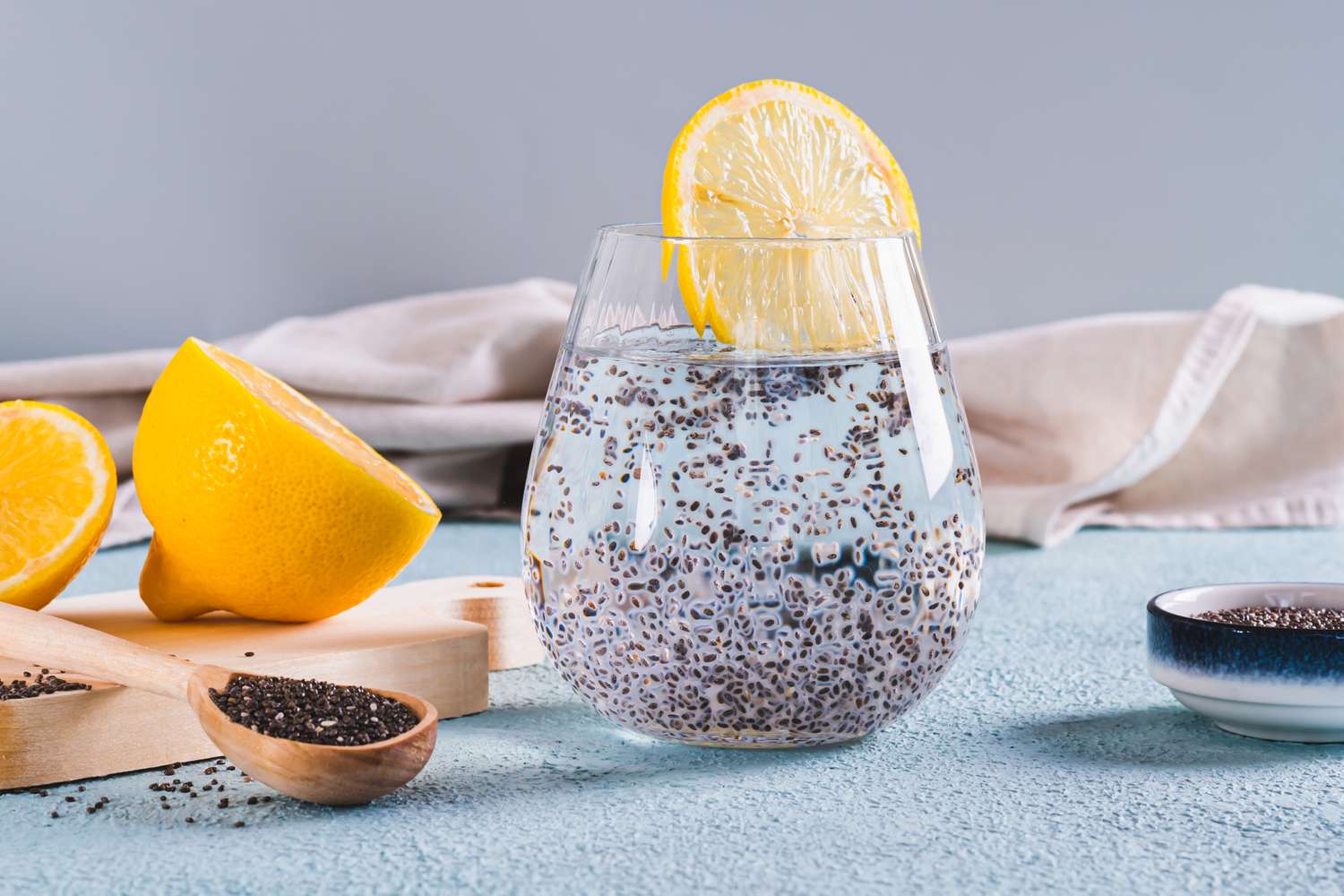Blog
4 Benefits of Drinking Chia Seed Water Regularly

- Chia seeds are packed with fiber, plant-based protein and healthy fats.
- Chia water can be made with 1 to 3 teaspoons of chia seeds for every 8 to 16 ounces of water.
- This drink may help improve digestion, support heart health and keep you feeling full longer.
Once known for sprouting as “hair” on quirky ceramic pets, chia has finally earned recognition as a nutritious and convenient addition to a healthy diet. Packed with fiber, plant-based protein, and healthy fats, chia seeds offer health benefits when added to your daily routine. “Studies show the fiber in chia seeds helps to lower risk of heart disease, diabetes, and digestive disorders,” says Sheri Gaw, RDN, CDCES, who recommends chia seed water as a unique way to enjoy these powerful seeds.
Curious about the benefits of chia seed water? Here’s what dietitians want you to know before you start sipping.
Health Benefits
They Help Keep You Regular
Chronic constipation affects up to 12 percent of adults, while many more have intermittent struggles with regularity. Fiber is a first-line defense for managing constipation, and chia seeds are a good source of both insoluble and soluble fiber. Soluble fiber dissolves in water, forming a gel-like substance in the digestive tract, while insoluble fiber stays intact as it moves through. “When mixed with water, they (chia seeds) form a gel-like consistency which helps thicken or soften your stools, making them easier to pass,” says Katrina Cox, MS, RD. The insoluble fiber in chia seeds can help stimulate the gut to increase transit time, so stool spends less time sitting in the colon.
And if you have the opposite problem, chia seed water is still a good choice. “It can also be beneficial to those who are dealing with loose stools as the chia seeds absorb excess liquid in your colon,” says Cox.
They Support Better Blood Sugars
One ounce of chia seeds provides 35 percent of the recommended daily value of fiber, a nutrient that supports healthy blood sugar regulation., “Fiber helps to slow down the absorption of the carbs from your meal, which means you won’t get a blood sugar spike and crash that can leave you hangry,” says Amanda Sauceda, MS, RD. This benefit supports not just those with diabetes but also anyone seeking more stable energy levels.
They May Aid in Weight Loss
Chia seed water isn’t a magic weight loss drink, but it may help you feel more satisfied throughout the day, which can be a big win if you’re trying to manage your weight. “The fiber, protein, and healthy fats in chia seeds help to slow down digestion and promote a feeling of fullness,” says Gaw. Slowed digestion can help you feel fuller longer and may lead to fewer snack cravings or overeating later on.
Your Heart Health May Improve
“Drinking chia water can help increase your hydration and intake of fiber, omega 3 fats, and antioxidants,” says Vandana Sheth, RDN, CDCES, FAND, all factors that support a healthy heart. According to one recent meta-analysis, chia seed supplementation improves inflammation by lowering C-reactive protein in the body and improves waist circumference and blood pressure, all factors in reducing heart disease risk. The anti-inflammatory properties of chia seeds are likely related to the high level of alpha-linolenic acid (ALA) and other natural antioxidants like quercetin and kaempferol.
Chia Seed Water Nutrition
According to the USDA, one ounce (about 2 tablespoons) of chia seeds has:
- Calories: 138
- Carbohydrates: 11.9 g
- Fiber: 9.8 g
- Protein: 4.7 g
- Total Fat: 8.7 g
- Iron: 2.2 mg
- Magnesium: 95.1 mg
How to Make it and How Much to Drink
“Chia water can be made with 1 to 3 teaspoons of chia seeds for every 8 to 16 ounces of water,” says Gaw, who recommends limiting chia water to one to two servings per day. And you don’t have to stick to plain water, either. Flavorful additions like fresh-squeezed citrus juice, herbs, and cucumbers can make this fiber-filled drink more appetizing, so it’s a beverage you can look forward to sipping.
But, if you can’t get past the texture of chia water, you’re not alone. “Personally, I think the texture of chia seed water is a hard sell for many people, so finding other ways to reap the benefits of fiber, healthy fat and plant-based protein is worth the effort,” says Emily Villaseca, RDN, who recommends adding chia seeds to foods like oatmeal, yogurt, soups and even chicken salad to make the texture more appealing.
Precautions
As with most foods that can support your health, there are a few things to consider before adding chia seed water to your daily diet.
Start slowly. Drinking too much chia seed water at once may lead to some discomfort, especially if you’re not used to hitting your fiber goals. “If your body is not used to a lot of fiber, you’ll want to gradually introduce chia seed water to avoid any GI issues like bloating, cramping, constipation, or gas,” says Sheth.
Check your medications. “Chia seeds may interact with several medications, in particular, blood thinners, medications for diabetes, and blood pressure medications,” warns Gaw. Eating large amounts of chia seeds while on any of these medications could cause adverse effects, especially if chia seeds are a new addition to your diet. Always speak to your health care provider to ensure they’re safe with your current medication regimen.
Drink plenty of water. Be sure to drink fluids throughout the day and to mix your chia seeds with enough water. Because they absorb fluid, eating chia seeds with too little liquid can be a choking hazard, and not increasing your fluid intake along with your fiber can lead to uncomfortable symptoms like cramping, bloating, and constipation.
Our Expert Take
Chia seed water is a simple, fiber-packed drink that offers a range of health benefits from digestion to heart health. It’s not a miracle fix, but when enjoyed as part of a balanced diet, it’s a smart and easy way to get more nutrients in your day. Just be mindful of how much you drink, start slowly, and monitor any potential medication interactions.












